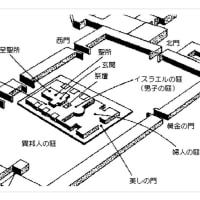エレミヤ書11章 主との契約に生きる
預言書が難しく感じるのは、それが一気に書き下ろされたものではなく、時代も背景も異なる場面で語られたものを集めたものだからです。そして実際のところ背景もよくわかっていません。ですから、歴史的文脈よりも、文学的文脈の中で読み解くこともあります。
1.契約のことば
まず今日読む11章と明日の12章は、続きものですが、この預言の背景については二つの説があります。一つはヨシヤ王の時代のものと考える説です。BC612年、ヒルキヤによって律法の書が発見されると、ヨシヤ王は、エルサレム中心の礼拝と国民の再献身を求める宗教改革(2列王22:8)を進めました。これをエレミヤは積極的に支持し、「契約のことば」(2節)に耳を傾けるように民に語りかけた、というわけです。他方これをエホヤキム王の時代のものと考える説があります。つまりBC605年頃、ヨシヤの改革への反動が起こり、「契約のことば」、つまり律法が廃棄される事態が生じたので、エレミヤはこれを契約違反として告発した、と言うわけです(9節)。両者は真逆の説ですが、いずれが真実に近いのか、判断が難しいのです。ただ、注目すべきは、エレミヤが神のことばとして伝える「契約のことば」が何を意味したかです。実はこのことば、ここで突然出てくるのです。それは、歴史的に「父祖たちと結んだ(10節)」ものなのか、申命記契約なのか、シナイ契約なのか、種々特定しようとする議論もあります。しかし素直に読んでいくなら、この「契約のことば」は、3-5節の内容と言うべきでしょう。そしてそれは、簡潔に言うと、神のことばに聞き従い、神の命じることを行うというものなのです。その場合、大切なのは、神のことばを書面通りに行うというよりも、神のことばに向かう、姿勢や態度が問いかけられているという点でしょう。
というのも、この後の31-34章では、「新しい契約」ということばが出てきますが、そこでは心において神とつながることが強調されています。神に聞くというのは、BGMを聞くような感覚ではなく、ある意味で身を乗り出して聞く、聞いたら、よく考えて実行するというものであるということです。
2.エレミヤへの陰謀
さて、15-17節は、契約違反者に対する神の裁きがあることをエレミヤは伝えています。すると、エレミヤに対する暗殺計画が持ち上がり、それが事前にエレミヤに知らされたと言うのです(18節以降)。何とも、痛いところを突く、聞くに堪えないことを聞かされて、人々が暴力的に反応したというわけです。起こりうることが起こったというべきでしょう。
ともあれ契約違反は、最終的には信義則を犯す、相手の信頼を裏切ることを意味するものです。ですから、神の言葉に聞く姿勢を貫き、契約を守るエレミヤに対して、神もその信頼を裏切らずに、エレミヤの危険を知らせてくださいました(18節)。そして、エレミヤも神の信頼を裏切ることなく、神の守りを信頼し、その危機的状況を神に委ねています(20節)。
信仰において大切なのは、この心の結びつきです。神と心において深い絆を持つこと、不器用であれ、神を恐れ、神に信頼し、神と心交わす関係を持つことです。ただ聖書に書かれたこと、一般にクリスチャンが言っているようなことを行って、キリスト教徒らしい生き方をすることではありません。「心とその奥にあるものを試す万軍の主(20節)」を信じることが信仰なのですから。今日も、この私の心を愛する神の心を愛する歩みを進めさせていただきましょう。
<クイズコーナー>
最初に、昨日のクイズです。エレミヤの初期の預言として、エホヤキム王の治世中の預言となる部分は、どこになるでしょうか?①2:1-6:30、②7:1-20:18、③21:1-25:38。答えは、②7:1-20:18でした。ちなみに①2:1-6:30は、ヨシヤ王の時代、③21:1-25:38は、エホヤキム王の後、ゼデキヤ王の時代の預言になります。では今日の聖書クイズです。エレミヤの書記、また書いたものの朗読者としてエレミヤに仕えた人物は次の誰でしょうか?①バルク、②ヨセフォス、③ゲダルヤ、答えはまた明日。では今日も良き一日であるように祈ります。
Jeremiah 11: Living in Covenant with the Lord
The reason the prophetic books seem difficult is that they are not written down all at once, but are a collection of words spoken at different times and in different situations with different backgrounds. And in fact, the background is not well known. Therefore, we may read it in a literary context rather than a historical context.
1. the language of the covenant
First of all, chapter 11, which we read today, and chapter 12, which we will read tomorrow, are a continuation, but there are two theories about the background of this prophecy. One theory is that it dates from the time of King Josiah, who, after the discovery of the Book of the Law by Hilkiah in 612 BC, promoted a religious reform (2 Kings 22:8) that called for Jerusalem-centered worship and the rededication of the nation. Jeremiah actively supported this, telling his people to listen to the "words of the covenant" (v. 2). Others believe that this was during the reign of King Jehoiakim. In other words, around 605 BC, there was a backlash against Josiah's reforms, and the "words of the covenant," or the Law, were discarded, and Jeremiah accused him of violating the covenant (v. 9). The two theories are diametrically opposed, and it is difficult to determine which is closer to the truth. What is noteworthy, however, is what Jeremiah meant by the "words of the covenant" that he conveys as the Word of God. In fact, this word suddenly appears here. Some have tried to specify whether it is the historical "covenant made with the fathers (v. 10)," the Deuteronomistic Covenant, the Sinai Covenant, and so on. However, if we read it honestly, we should say that the "word of the covenant" is the content of verses 3-5. The "word of the covenant," as it is simply put, is to listen to God's word and obey it, and to do what God commands. In this case, the important point is that the question is not so much about obeying God's Word as it is about attitude and attitude toward God's Word.
In the chapters 31-34 that follow, the phrase "new covenant" is used, and the emphasis is on connecting with God in the heart. Listening to God is not like listening to background music.
2. the plot against Jeremiah
Now, verses 15-17 tell Jeremiah that there will be God's judgment on covenant violators. Then he says that an assassination plot against Jeremiah was hatched and that Jeremiah was informed of it in advance (v. 18 onward). What a painful, unheard-of thing to be told, and the people reacted violently. It should be said that what could have happened did happen.
At any rate, a breach of contract ultimately means a breach of faith, a betrayal of the other party's trust. Therefore, to Jeremiah, who remained attentive to God's word and kept his covenant, God did not betray his trust either, but informed Jeremiah of his danger (v. 18). And Jeremiah, too, does not betray God's trust, but trusts in God's protection and entrusts his perilous situation to God (v. 20).
It is this bond of the heart that is important in faith. To have a deep bond with God in the heart, to fear Him, to trust Him, to have a heart-to-heart relationship with Him, however clumsy it may be. It is not just about doing what the Bible says, or what Christians generally say, and living a Christian life. It is about faith, because faith is believing in "the Lord of hosts (v. 20), who tests the heart and what is in it." Today, let me continue to walk in love with the heart of God, who loves this heart of mine.
<Quiz Corner>
First, here is yesterday's quiz. What part of Jeremiah's early prophecy would be a prophecy during the reign of King Jehoiakim? The answer is (1) 2:1-6:30, (2) 7:1-20:18, and (3) 21:1-25:38. Incidentally, (1) 2:1-6:30 refers to the time of King Josiah, and (3) 21:1-25:38 refers to the time of King Zedekiah after King Jehoiakim. Now for today's Bible quiz. Who of the following served Jeremiah as his scribe and reciter of what he wrote? (1) Baruch, (2) Josephus, and (3) Gedaliah. I wish you a good day today.



















